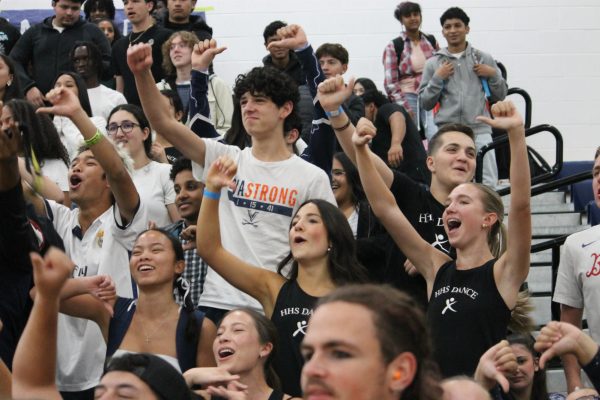National immigration fight has real effect on local area
Information from New Bridges Immigrant Resource Center and HCPS.
The government shutdown has now dragged on for over a month. The issue holding up negotiations: immigration, and more specifically, the construction of a southern border wall.
Many students at HHS have experienced the difficulties of immigrating to a new place first hand. Forty-six percent of HCPS students were not born in the U.S. according to school system data.
Junior Alejandra Henriquez is one of them.
“I really had no plan with my country; what I was going to do in the future,” Henriquez said. “[I remember] when my grandma told me that I had to come [to the U.S.]. She came to my school and said, ‘You have to leave the country and do this and this.’ It was too much in the moment.”
Unlike some, Henriquez didn’t have to make the journey by foot.
“I was able to come in a legal situation, and I had everything ready to come,” Henriquez said.
That doesn’t mean that there weren’t struggles. For one, her great grandmother died just before she left.
Not to mention that it’s always hard to transition to a new place.
“Trying to make friends and trying to integrate yourself with other people and forgetting about some of the things that happened in the past [is hard],” Henriquez said. “I [used to have] to travel an hour to go to school, and things could happen on the bus ride. I think trying to forget some of those things and feel more safe here [is difficult].”
Despite these issues, Henriquez thinks HHS has helped her.
“I think the school is getting used to taking people in from different parts of the world, and they’re getting used to speaking different languages,” Henriquez said. “I think when students can go home to their families and say, ‘I made friends with a kid from another country,’ those parents can feel more comfortable with immigration and accepting people from different countries.”
As far as the national debate though, Henriquez is nervous about sharing an opinion.
“I just try to maintain my distance and be far away from that sort of debate,” Henriquez said.
For home-school liaison David Shenk, the effects of the national situation are constantly in mind as he works with immigrant families.
“There are definitely families that express more fear and uncertainty about the future, just a heightened sense of fear in terms of what might come of their lives, of their well-being,” Shenk said.
What may seem like an abstract national issue is painfully real for many people in the Harrisonburg community.
“One of our families here in Harrisonburg had a family member who was travelling in the [migrant] caravan. That was definitely worrisome and of concern for them,” Shenk said. “[There are] students who are having to work to pay for lawyer fees… All of that definitely affects students’ ability to be able to concentrate on school and just be students.”
ESL teacher Ben Kurtz feels this uncertainty in the classroom.
“The problem is the overall anti-immigrant tone. You can sense that with students. If they’re from Iraq or if they’re from Honduras, they get that. They know that they don’t feel supported by the president of the country that they live in,” Kurtz said. “I don’t even have to elicit that from anyone [in the classroom]. You can just hear comments.”
In addition to teaching, Kurtz serves on the board of the New Bridges Immigration Resource Center, a local organization that seeks to provide help for immigrants in the local area.
It’s because of services like New Bridges and the school system that Kurtz believes Harrisonburg does very well welcoming immigrants compared to other American cities.
“We don’t talk about us and them,” Kurtz said. “We talk about our students, our neighbors. We don’t draw that imaginary line between who belongs here and who does not… We just talk about our students and how we’re going to serve our students.”
Your donation will support the student journalists of Harrisonburg High School. Your contribution will allow us to purchase equipment and cover our annual website hosting costs.














